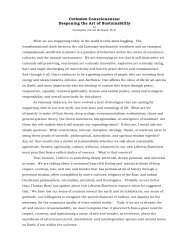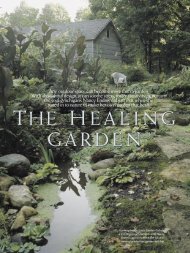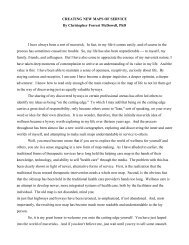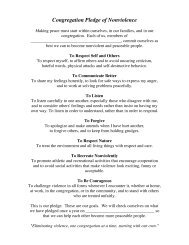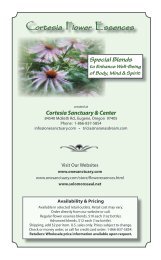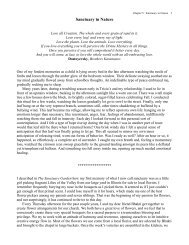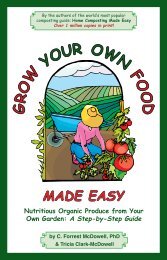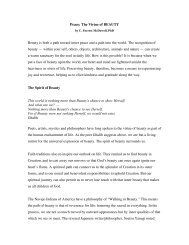Three Cortesian Devotions By Christopher Forrest McDowell, PhD A ...
Three Cortesian Devotions By Christopher Forrest McDowell, PhD A ...
Three Cortesian Devotions By Christopher Forrest McDowell, PhD A ...
- No tags were found...
You also want an ePaper? Increase the reach of your titles
YUMPU automatically turns print PDFs into web optimized ePapers that Google loves.
elationship we might imagine to exist between a place, hope, and peace. But it alsostarkly contrasts two opposing tools of technology: the bomb and the hoe. As historianLeo Marx suggests, the split desire for “two kingdoms of force” — the machine and thegarden — is at the center of modern cultures. And for many people it is at the center oftheir perception of place. When homes are razed to create a new high rise or freeway,souls are displaced. When a community garden is paved over for parking, the souls andseasonal aspirations of numerous families are momentarily displaced. When a favoritehangout closes, our spirit shudders. When an old familiar park bench is vandalized orremoved, our spirit is demoralized.Increasingly, humans are becoming more and more nomadic. Most families inmodern societies have little or no roots to place. Because of changes in work, break-upof the family, or illness or crime, many people are continuously on the move, as often asevery two years according to social researchers. War, drought, natural disasters, anddestruction of local natural habitat uproot many people from places ripe with cultural andgeographic history. Without a sense of place to lay down roots, tens of millions ofhumans are literally orphaned on this planet each day — orphaned from their land,homes, stories, crafts, spiritual beliefs, and myths. Animals, insects, and plant speciescan also be included in this mobile orphanage, as destruction of natural habitat divorcesthem from nesting, foraging, mating, and distribution patterns.Of course, in modern societies the goal seems to be about leaving home. Most peopledon’t even give a second thought as to the cultural and geographical history of the placethey grew up, or the place they ultimately land to start a family themselves. As authorValerie Andrews states, “most of us have yet to realize how we are shaped by a givenregion, how our character is formed by simply being where we are.” She goes on tosuggest that by abandoning our places/homes, we attempt also to flee ourselves, dreamingof the happiness we might find in a new place. We strive for bigger and better, searchingfor something outside of ourselves to fill the void resulting from our restless instabilityand unease with ourselves and our place.In Keepers of the Earth, Native American Jeanette Armstrong explains that, in herOkanagan beliefs, not to know and celebrate that “we are our land/place is to be displacedand that unless place can be relearned, it compels all other life forms to displacement andthen ruin.” Anthropologist, Ashley Montague suggests that this displacement takes theform of a broken bond with a necessary matrix, a matrix, much like a womb, that offerssafety and harbors potential. Since our family came to the land we call Cortesia overfourteen years ago, we know first hand what Armstrong and Montague are talking about.I remember, for example, our first night’s stay at Cortesia. We were awed by thesound of great horned owls in the deep woods surrounding our homestead. This was fall,but the next spring we awoke to the sound of chainsaws. Over the course of the summerhundreds of acres of 100-year old woods were cut on surrounding parcels. I climbed tothe top of a 150-year old fir near our house and peered out, as an owl would I am sure,over the devastation. That fall there were no hooting owls, and to this day we rarely hearone.



